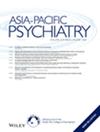Ghrelin and depressive symptoms in patients with first-episode drug-naïve major depressive disorder: The mediating role of hypothalamic-pituitary-adrenal axis
Abstract
Background
Major depressive disorder (MDD) is one of the global burdens of disease, and its pathogenesis remains unclear. An increasing amount of research indicates that ghrelin regulates mood in patients with MDD. Still, current results are inconsistent, and the mechanisms underlying how ghrelin modulates depressive symptoms are inconclusive, especially in first-episode drug-naïve MDD patients. Therefore, this study aims to investigate the relationship and potential mechanism between ghrelin and first-episode drug-naïve MDD.
Methods
Ninety first-episode drug-naïve MDD patients and 65 healthy controls (HCs) were included. Hamilton Depression Scale (HAMD-17) as a measure of depressive symptoms. Plasma levels of ghrelin and hypothalamic–pituitary–adrenal axis (HPA-axis) hormones were measured in all participants.
Results
Compared to HCs, the ghrelin levels were higher in the MDD (p < .001) and still showed significance after covarying for sex, age, and Body Mass Index (BMI). Ghrelin was positively related to corticotropin-releasing-hormone (CRH) levels (r = .867, p < .001), adrenocorticotropic hormone (ACTH) levels (r = .830, p < .001), and cortisol levels (r = .902, p < .001) in partial correlation analysis. In addition, there was a positive correlation between HAMD total score and ghrelin levels (r = .240, p = .026). Other than that, the HAMD total score also had a positive correlation with the CRH (r = .333, p = .002) and cortisol (r = .307, p = .004) levels. Further mediation analysis demonstrated that the relationship between ghrelin and HAMD total score was mediated by CRH (ab-path; β = .4457, 95% CI = 0.0780–1.0253, c-path; β = .2447, p = .0260, c′-path; β = −.2009, p = .3427).
Conclusions
These findings revealed that plasma ghrelin provides a pivotal link to depressive symptoms in first-episode drug-naive MDD patients. CRH mediated the relationship between ghrelin and HAMD total score. It might provide new insights into understanding the pathogenesis of MDD, contributing to intervention and treatment from this approach.

 求助内容:
求助内容: 应助结果提醒方式:
应助结果提醒方式:


